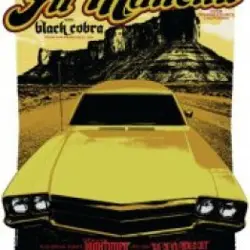 Fu Manchu
Fu ManchuDid you grow up in the '90s? Did you have long hair, a skateboard, blue jeans and a trucker shirt that was way too short for you? Fair enough, not everyone did. But if you did, you were more or less a part of a very unique and uncompromising culture that grew out of '80s punk bands, and eventually developed into the sludgy stoner rock of the late-'80s and early-'90s, before it arguably died on its arse with the rise and fall of grunge. And, if you were part of that culture, you've most likely heard of - or more likely loved - Fu Manchu, one of the great progenitors of that sound (before the eventual arse-dying).
Releasing their debut single Kept Between Trees in 1990, Fu Manchu have survived the last 20 years, albeit with constant line-up changes, in relative safety as a band; they have never really compromised their sound, retaining the hard-rock edge tempered with a casual attitude that came to be with bands like Melvins, Kyuss and Acid King. Fu Manchu were just one in a long line in that aesthetic, but the fact that they have stuck buy it (latest album Signs Of Infinite Power was released in 2009) means that they have a healthy base of respect from fans and musicians alike.
Speaking from his beachside SoCal home, founding member, guitarist and vocalist Scott Hill explains how the style of Fu Manchu developed. “I grew up listening to a lot of hardcore punk rock stuff from 1980 to 1987,” he begins, the musician's laidback attitude exuding through his Californian drawl and penchant for the word “stuff”. “I still listen to all that stuff today as well. You know, I still look at it as Fu Manchu's tunes as a slowed-down hardcore band. That's the kind of stuff that got me amped to start a band and play guitar in the first place, going to see those bands play. It's always there; there's always a bit of that aesthetic entering into the stuff we write.”
Speaking of the great stoner rock pilgrimage of the time, Hill goes on to rattle of a list of the big names in the movement, but not solely as inspiration; Hill explains that the growth of the sound lead him to go back in time to find its roots. “I'd heard bands like Soundgarden and Nirvana and the Melvins were always pretty big where I grew up. And The Obsessed, stuff like that,” he reflects. “Around about '88 was when that stuff became big and we went, 'Oh, maybe we should put on our old Blue Cheer records and KISS records and check this stuff out again'. That's where we eventually drew it from, from those old metal and rock bands that brought in a lot of fuzz and distortion and stuff that had lead on to the bands we were listening to at the time,” he reflects.
Don't miss a beat with our FREE daily newsletter
“It was still loud stuff, but it was slower and there was this whole new life the music took on with that.” Fu Manchu's adherence to those principles may at first make them seem stale in the current climate of flash-in-the-pan styles and genres, but Hill is flippant about the need to accommodate. “I know people want to hear bands evolve and progress,” Hill elucidates, when asked whether there was any impetus to adapt. “I mean that's great, I do to, but at the same time I don't want to get a record from a favourite band of mine and all of a sudden there's a drum machine and no bass or whatever and you go, 'Huh?'. But you know, I can understand how people wanna hear something different. And we do try some different stuff sometimes, some mellower stuff, like California Crossing was a little cleaner than the previous records. But we've never really wanted to change, the old rock thing's still there.
“We're just a straight-ahead rock band. That's how we started and I think that's how it's always been. Obviously, everyone's gotten a little better musically, but it's pretty much always stayed the same. I knew what I wanted to play when I started and, like I said before, you know what you're getting when you buy a Fu Manchu record; it's gonna be a loud rock record. We're not gonna be pulling out a reggae song on the record, you can be rest assured,” Hill says with a wry chuckle. “It's always stayed the same, it's just all four of us doing that really basic thing.”
In some ways, the band takes avoiding trends to the extreme; Hill admits that he has very little knowledge of where music is nowadays. “It's never really been something that's important to us. You know, we're friends with a whole lot of different bands, but to be honest, I really have no idea what's happening in music today,” Hill laughs. “The last band I saw was [legendary Californian doom metal band] Fear and the played through their whole first record. I'm still spending my time seeing those bands that I grew up with. Whatever's really happening, we don't pay much attention to. In 1996, we were touring with Limp Bizkit and Deftones. So, you know, definitely out of our element there about what was happening with music, but whatever,” Hill finishes with breezy casualness, assuaging the point that he's not too worried about that tenuous connection to certain musical abominations of the last 15 years.
Along with the stringent belief in the basic rock format, Hill does little to complicate his lyrics. Instead, he bases everything on simple ideas, which goes par for course in connecting with fans. To this end, there has always been three very strong elements to the lyrical and contextual content of Fu Manchu songs; cars, skating and girls. “Growing up on a beach, there's always been like custom vans and El Caminos and choppers and stuff around me and the band and we all grew up skating at the same time. And then our lyrics are very literal – I don't get religious or anything, I just write lyrics about stupid stuff like cars and, like, UFOs,” Hill laughs. “There's no deep meaning behind those lyrics, there just all things I see and like. It's just stuff you remember. My dad got me into big muscle cars and customs and stuff and I just really liked that whole scene for the record artwork and song titles and stuff.
“With the skating, I guess maybe because it's aggressive and it gets people pumped up, which is a lot what skating's about. I know when I go surfing, I wanna hear something heavy, so I just think it gets people amped. It's not like a bring up religion or war or anything in my lyrics, it's always just really basic stuff that appeals to me and the band in a simple way. And if that appeals to fans, then that's great; that's probably what we're aiming for. We just want people to get into it, bob their heads and move around a little. There's nothing really more to it.”















